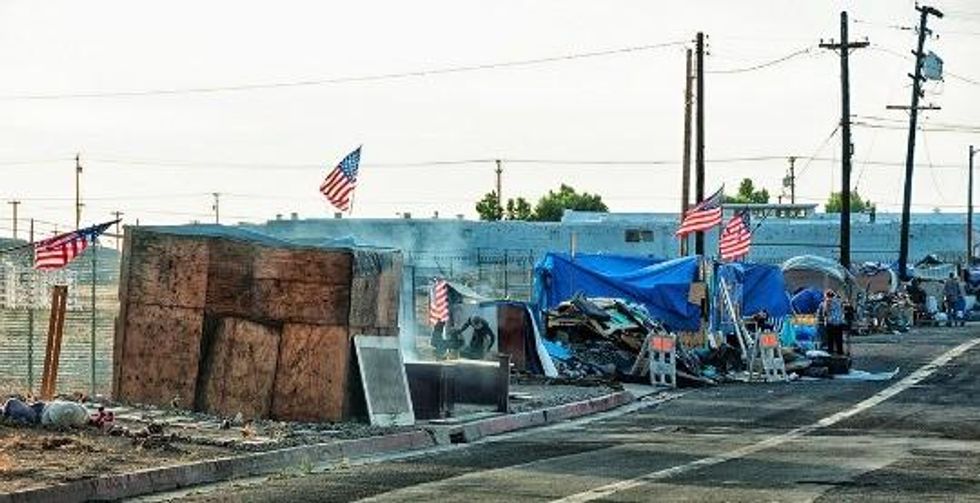As Wednesday marked fifty years since President Lyndon B. Johnson declared the need for an "unconditional war on poverty in America," a growing number of Americans are calling for a renewed fight.
With roughly a third of Americans living in poverty or near-poverty conditions, rightwing critics and media pundits charge that the 'War on Poverty' was a failure. However, as policy expert Terrance Heath writes on the Campaign for America's Future blog, "America hasn't lost the war on poverty. We stopped fighting it."
Launched in 1964, under the banner of the 'War on Poverty,' the Johnson administration created a number of important federal and state initiatives including Medicaid, Medicare, subsidized housing, Head Start, legal services, nutrition assistance, raising the minimum wage, and, later, food stamps and Pell grants.
According to Census statistics that factor in the effect of anti-poverty programs, in the decade from 1959 to 1969 the poverty rate dropped from 22.1 percent to 13.7 percent -- what Johnson aid Joseph Califano called "the most dramatic decline over such a brief period in this century."
"Today over 100 million people comprise what the U.S. Census calls the poor and the 'near poor,' based on a new definition of poverty that measures living standards, not just income," notes Occidental College Professor Peter Dreier. "Almost one-third of the nation, in other words, can barely make ends meet."
Further, about one-quarter (22 percent) of America's children now live in poverty.
By many measures, the U.S. is experiencing a resurgence of poverty. Americans have experienced over a decade of declining or stagnant wages, rising joblessness, and an epidemic of foreclosures coupled with the legislative slashing of important safety net provisions such as food stamps and unforeseen levels of wage disparity.
According to a Center for American Progress survey published Tuesday, increasing numbers of Americans say they experience "direct economic hardship." The think-tank survey found that:
Sixty-one percent of Americans say their family's income is falling behind the cost of living, compared to just 8 percent who feel they are getting ahead and 29 percent who feel they are staying even. Twenty-five percent to 34 percent of Americans report serious problems falling behind in rent, mortgage, or utilities payments or being unable to buy enough food, afford necessary medical care, or keep up with minimum credit card payments.
Now, a half-century after LBJ's launch of the campaign against poverty and its early proven successes, Americans want to know what went wrong. As Dreier writes, "that steady drumbeat of anti-government blame-the-victim invective contributed to public skepticism that anti-poverty policies can work."
He continues:
The most famous one-liner in this arsenal is President Reagan's statement, in his 1988 State of the Union address, "My friends, some years ago, the Federal Government declared war on poverty, and poverty won." That cynical remark was intended not only to disparage government efforts to uplift the poor but also to justify major cuts in social programs, which contributed to a significant increase in poverty during the 1980s - a trend repeated in the first decade of the 21st century, even before the current recession, while George W. Bush occupied the White House.
"If progress against poverty has been disappointing over the past half century, the reason is not the decline of the family but the rise of extreme inequality," writes New York Times columnist Paul Krugman. "We're a much richer nation than we were in 1964, but little if any of that increased wealth has trickled down to workers in the bottom half of the income distribution."
"The trouble is that the American right is still living in the 1970s, or actually a Reaganite fantasy of the 1970s; its notion of an anti-poverty agenda is still all about getting those layabouts to go to work and stop living off welfare," he adds.
As Nation contributor Zoe Carpenter points out, many right-wing legislators will use this anniversary as a opportunity to "condemn any new investments in the economy, in education and in the safety net."
"If some Republicans are distancing themselves from the old argument that personal failings cause poverty, it's to assert that government failure is responsible instead," she writes.
However, according to the CAP survey, at least 80 percent of respondents support expansion of the social safety net and other progressive policy proposals including: financial assistance for childcare, an expansion of nutrition assistance, universal pre-K, more publicaly funded scholarships, and increasing the minimum wage.
Reporting on the survey results, Carpenter continues:
Nearly 80 percent agreed that "most people living in poverty are decent people who are working hard to make ends meet in a difficult economy," including 66 percent of white conservatives and libertarians. The poll showed nearly equal agreement across race and party lines on the point that a shortage of jobs with good wages is the primary reason for poverty in America, and that the poor receive unfair criticism.
Many Americans, she adds "have the appetite for an anti-poverty agenda driven by government investment."
"The fate of the poor [...] hangs upon the decision of the better-off," wrote Michael Harrington in his seminal 1962 book on poverty, The Other America. "If this anger and shame are not forthcoming, someone can write a book about the other America a generation from now and it will be the same or worse."
_____________________



